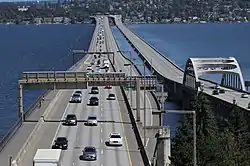Homer M. Hadley Memorial Bridge
The Third Lake Washington Bridge, officially the Homer M. Hadley Memorial Bridge, is a floating bridge in the Seattle metropolitan area of the U.S. state of Washington. It is one of the Interstate 90 floating bridges, carrying the westbound lanes of Interstate 90 across Lake Washington between Mercer Island and Seattle. The floating bridge is the fifth-longest of its kind in the world, at 5,811 feet (1,772 m).
Homer M. Hadley Memorial Bridge | |
|---|---|
 The two spans of the Homer M. Hadley Memorial Bridge (left) and the Lacey V. Murrow Memorial Bridge (right) in 2016, looking east toward Mercer Island | |
| Coordinates | 47°35′23″N 122°16′08″W |
| Carries | |
| Crosses | Lake Washington |
| Locale | Seattle, Washington, U.S. |
| Maintained by | Washington State Department of Transportation |
| Preceded by | Lacey V. Murrow Memorial Bridge |
| Characteristics | |
| Design | Pontoon bridge |
| Total length | 5,811 ft (1,771 m) |
| History | |
| Opened | June 4, 1989 |
| Location | |
History
A third floating bridge on Lake Washington was proposed in the 1950s during construction of the Evergreen Point Floating Bridge to the north. After several locations were considered, a span parallel to the existing Lake Washington Floating Bridge (now the Lacey V. Murrow Memorial Bridge) was chosen in the 1960s.[1] The first pontoon for the new bridge was floated from Everett to Lake Washington in September 1983.[2]
The bridge opened in June 1989 and was named in 1993 for Homer More Hadley, who designed the bridge's companion span, the parallel Lacey V. Murrow Memorial Bridge.[3] Hadley also designed the McMillin Bridge in Pierce County.[4] It originally carried bidirectional traffic while the older Murrow Bridge underwent extensive renovations.[5] On November 25, 1990, sections of the Murrow Bridge sank during a windstorm that flooded several pontoons; the sinking sections also severed 13 of the 58 anchor cables of the Hadley Bridge, which remained closed for several days.[6]
Following the reopening of the Lacey V. Murrow Memorial Bridge, two reversible high-occupancy vehicle (HOV) lanes were set up on the Hadley Bridge to accommodate the traffic flow between Seattle and the suburban Eastside (westbound in the morning, eastbound in the evenings).[5] The lanes were opened to all Mercer Island commuters, including single-occupant vehicles, per a 1978 agreement negotiated by the city government.[7] The reversible lanes were planned to be converted for light rail use at a future date, but design issues prevented a simple conversion from being feasible.[8]
Sound Transit and the Washington State Department of Transportation added HOV lanes to the bridge's westbound lanes in 2017.[9] This preceded construction of the 2 Line, a light rail line from downtown Seattle to Bellevue and Redmond which will use the former reversible express lanes. When this section of the 2 Line, scheduled to be completed in 2025,[10] begins operation, it will be the first permanent railroad on a floating bridge. The light rail line will employ a set of floating spans for tracks on the transition between pontoons and the fixed spans.[11][12] The Maxau Pontoon Rhine Bridge of 1865 in Germany was temporarily used for a railroad.
Usage

The bridge carries four westbound lanes, including a HOV lane, as well as a bicycle and pedestrian path on the north side. The path is 9 feet (2.7 m) wide and includes two barriers: a 54-inch (140 cm) outer railing and a 35-inch (89 cm) concrete barrier facing traffic.[13]
Prior to 2017, it also carried two reversible lanes, configured to normally carry westbound traffic on weekday mornings and eastbound traffic at other times. Use of the reversible express lanes was restricted to HOV traffic, except for vehicles traveling to and from Mercer Island.
With a total of five traffic lanes and three full-sized shoulders, the Third Lake Washington Bridge was the widest floating bridge in the world, until the completion of the new Evergreen Point Floating Bridge in 2016.[14]
References
- "Rosellini Urges New Lk. Span Plan". Seattle Post-Intelligencer. October 16, 1962. p. 9.
- "Floating bridgework". The Seattle Times. September 28, 1983. p. A1.
- Higgins, Mark (July 17, 1993). "Floating bridge to bear name of innovator Hadley". Seattle Post-Intelligencer. p. B1.
- Todd Matthews (November 16, 2012). "Fearing its demolition, preservationists nominate McMillin Bridge to Pierce County's historic register". Tacoma Daily Index.
- "A History of Highways & Transportation" (PDF). Washington State Department of Transportation. May 1994. p. 21. Archived from the original (PDF) on March 20, 2011. Retrieved November 28, 2021.
- "Seattle Commuters Hostage to Wind". The New York Times. November 30, 1990. p. A16. Retrieved November 26, 2021.
- Higgins, Mark (September 2, 1993). "Mercer Island gets a road less traveled". Seattle Post-Intelligencer. p. B1.
- Nogaki, Sylvia (August 13, 1984). "I-90 lanes: failure to communicate". The Seattle Times. p. B1.
- "New I-90 HOV lane from Mercer Island to Bellevue opens today" (Press release). Sound Transit. March 29, 2012. Retrieved February 21, 2018.
- Lindblom, Mike (August 24, 2023). "Eastside-only light rail should open in March, Sound Transit says". The Seattle Times. Retrieved August 30, 2023.
- Lindblom, Mike (May 14, 2017). "World's first light rail on a floating bridge: For I-90, Sound Transit had to invent 'a brilliant solution'". The Seattle Times. p. A1. Retrieved February 21, 2018.
- Lindblom, Mike (June 1, 2017). "Mercer Island braces for new I-90 bottlenecks as light-rail work begins". The Seattle Times. p. A1. Retrieved February 21, 2018.
- Richard, Terry (October 25, 2008). "Washington freeway bridges prove bikes, cars can coexist". The Oregonian. Retrieved October 17, 2021.
- "Uniquely Northwest: Washington State is home to many of world's amazing floating bridges" (PDF). Hood Canal Bridge News. Washington State Department of Transportation. Summer 2003. p. 2. Archived from the original (PDF) on October 7, 2006. Retrieved July 24, 2015.